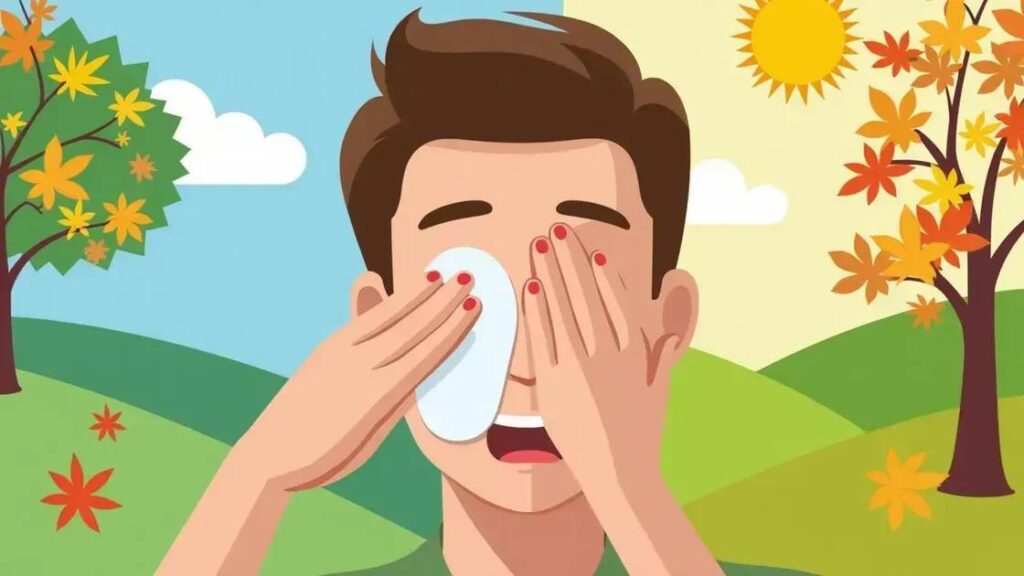Learning how to manage sinus issues during seasonal changes involves recognizing symptoms, utilizing effective home remedies, and adopting preventative measures such as staying hydrated, maintaining a clean environment, and monitoring allergens to enhance overall sinus health.
As the seasons change, many people struggle with sinus issues that can lead to discomfort and health problems. Sinusitis and allergies can be exacerbated by shifting temperatures and pollen counts, impacting quality of life. In this article, we’ll explore how to manage sinus issues during seasonal changes, offering practical advice and remedies to alleviate symptoms and promote well-being.
Understanding Sinus Issues and Seasonal Changes

Sinus issues are common problems many face, especially during seasonal changes. As the weather shifts, various allergens and environmental factors contribute to discomfort. During spring and fall, pollen levels rise, while winter can bring dry air and cold viruses into the mix.
Understanding how these elements affect sinus health is crucial. The sinuses are air-filled cavities in the skull, and when they become inflamed or infected, they cause symptoms like pressure, pain, and congestion. This inflammation can occur more frequently as we transition between seasons.
Allergens and Their Impact
Different seasons introduce unique allergens. In spring, tree pollen is prevalent, while grass pollen dominates in the summer months. Fall brings ragweed, and winter can lead to indoor allergens like dust mites and pet dander due to more time spent indoors. These allergens can irritate the nasal passages and lead to sinus issues.
Weather Changes and Sinus Problems
Weather changes, like humidity and temperature fluctuations, can also play a role in sinus conditions. For example, abrupt temperature drops can lead to a buildup of mucus in the sinuses, causing pressure and pain. Additionally, changes in barometric pressure can trigger headaches and sinus discomfort.
Understanding Symptoms
Common symptoms related to seasonal sinus issues include nasal congestion, headaches, facial pain, and reduced sense of smell. Recognizing these symptoms early can help in managing them effectively. It’s important for individuals suffering from sinus problems to monitor their symptoms according to the season and act quickly to alleviate discomfort.
Symptoms of Seasonal Sinus Problems

Recognizing the symptoms of seasonal sinus problems is essential for effective management. Many individuals experience similar symptoms during seasonal changes due to allergens and environmental shifts.
Common symptoms include:
- Nasal Congestion: This occurs when nasal passages become swollen, making it difficult to breathe through the nose. It can lead to discomfort and a feeling of pressure.
- Facial Pain: Inflammation of the sinuses can cause pain, particularly around the eyes, cheeks, and forehead. This pain may intensify with movement or bending over.
- Headaches: Sinus pressure can lead to headaches, especially in the forehead region. These headaches may feel different than typical tension headaches.
- Runny Nose: Increased mucus production often occurs, leading to a runny or dripping nose, which can be annoying and uncomfortable.
- Post-Nasal Drip: Extra mucus can cause a sensation of dripping in the back of the throat, resulting in a sore throat or cough.
- Reduced Sense of Smell: Nasal blockage can hinder your ability to smell, significantly impacting taste as well.
Additionally, some individuals may experience fatigue, coughing, or ear pressure, as sinuses connect to nasal passages and ears. If any of these symptoms occur consistently during the seasons, it is vital to address them quickly and seek solutions. Understanding these symptoms helps individuals take proactive steps in managing sinus health as seasonal changes occur.
Effective Home Remedies for Sinus Relief

Finding effective home remedies for sinus relief can greatly enhance your comfort during seasonal changes. Many simple and natural options provide soothing relief and help alleviate symptoms.
Steam Inhalation
Inhaling steam is a popular remedy. Boil water and pour it into a bowl. Lean over the bowl with a towel over your head to trap the steam. Inhale deeply for about 10 minutes to help clear congested sinuses.
Saline Nasal Rinse
A saline rinse can help moisten the nasal passages and remove irritants. Use a neti pot or saline spray to flush out mucus and allergens from your sinuses. Be sure to use distilled or boiled water to avoid any contaminants.
Hydration
Staying hydrated is key. Drinking plenty of fluids helps thin mucus, making it easier to drain. Water, herbal teas, and broths are great choices. Avoid caffeine and alcohol, which can lead to dehydration.
Warm Compress
Applying a warm compress can relieve sinus pressure and pain. Soak a cloth in warm water, wring it out, and place it over your face, especially around the nose and forehead, for soothing relief.
Essential Oils
Using essential oils like eucalyptus or peppermint can provide additional relief. Add a few drops to a diffuser or mix with a carrier oil and massage onto your sinuses. These oils can help open nasal passages and improve breathing.
Spicy Foods
Eating spicy foods such as chili peppers can help thin mucus and reduce congestion. Spices can clear the nasal passages and provide temporary relief from sinus pressure.
Implementing these home remedies promotes sinus health and comfort. Remember to check with a healthcare professional if symptoms persist or worsen.
Preventative Measures for Future Seasons

Implementing preventative measures for future seasons can help manage sinus issues effectively. Taking care of your health ahead of time is key to reducing the severity of symptoms.
Maintain a Clean Home
Keeping your living environment clean can prevent allergens from accumulating. Regularly dust and vacuum to reduce pollen, dust mites, and mold. Use HEPA filters in your vacuum to trap small particles.
Monitor Pollen Counts
Stay informed about local pollen counts. On high pollen days, limit outdoor activities and keep windows closed to reduce exposure. Wearing a mask when outside can also help protect against inhaling allergens.
Stay Hydrated
Drinking plenty of water is vital throughout the year. Staying hydrated helps to thin mucus secretions and keeps nasal passages moist, making it easier to ward off congestion and irritation.
Allergy Testing
Consider getting tested for allergies. Knowing what you are allergic to can help you take specific steps to avoid allergens. Your doctor might recommend allergy medications or treatment to manage your symptoms better.
Annual Check-ups
Regular visits to your healthcare provider ensure you manage any chronic conditions. Discuss your sinus problems and any seasonal changes in health you experience. They can offer tailored advice or treatments.
Healthy Lifestyle
Maintaining a healthy lifestyle boosts your immune system. Regular exercise, a balanced diet, and enough sleep are crucial. Foods rich in vitamin C, omega-3 fatty acids, and antioxidants support overall health.
By taking these preventive measures, you can minimize the impact of sinus issues during seasonal transitions and support better overall sinus health.
In Summary: Managing Sinus Issues Effectively
Managing sinus issues during seasonal changes involves understanding the triggers, recognizing symptoms, and utilizing effective home remedies. By implementing preventative measures, you can reduce the likelihood of experiencing discomfort from sinus problems in the future.
Whether it’s through maintaining a clean living environment, staying hydrated, or seeking medical advice when needed, a proactive approach is key to improving your quality of life during changing seasons. Remember, taking care of your sinus health can significantly enhance your overall well-being.
By following these practices, you can enjoy the beauty of each season without the burden of sinus discomfort.
FAQ – Frequently Asked Questions about Managing Sinus Issues
What are common symptoms of sinus issues during seasonal changes?
Common symptoms include nasal congestion, facial pain, headaches, runny nose, post-nasal drip, and a reduced sense of smell.
How can home remedies help with sinus relief?
Home remedies like steam inhalation, saline rinses, and warm compresses can alleviate symptoms and promote drainage of the sinuses.
What preventative measures can I take for sinus health?
Maintaining a clean home, staying hydrated, monitoring pollen counts, and regular check-ups with your healthcare provider are effective preventative measures.
Can spicy foods help relieve sinus congestion?
Yes, spicy foods can thin mucus and clear nasal passages, providing temporary relief from sinus congestion.
How important is hydration for sinus health?
Staying well-hydrated is crucial as it helps thin mucus, making it easier for your body to drain congestion and keep nasal passages moist.
When should I seek medical advice for sinus issues?
You should consult a healthcare provider if your symptoms persist, worsen, or if you experience severe pain or fever.













